A decade ago, William Shakespeare was the most performed playwright in Australia. In 2024 not one mainstage theatre company in Australia will perform Shakespeare. The only exception will be Bell Shakespeare.
This shift has been a long time coming. Theatre makers such as Lachlan Philpott, Nakkiah Lui and Andrew Bovell have been calling for less Shakespeare and more new work since the mid-2010s.
Today, their advocacy is bearing fruit.
Of the 79 plays being performed in 2024, 68 (87%) were written after 2000, 60 (76%) were written after 2014, and 23 (29%) will have their world premiere in 2024. Only three were written prior to the 20th century – and that’s if you count Kip Williams’ new adaptation of Dracula, alongside Bell Shakespeare’s two plays.
New work is important. A truly rich cultural conversation must include a variety of voices and fresh perspectives. But alongside new work and new voices, nuanced engagement with the past is needed.
A forum for conversations
Shakespeare is important, not just because he wrote great plays, and definitely not because he is perfect. He is important because we have, for 400 years, made him important, using his work to have rich conversations about identity, truth, meaning and morality.
These conversations are worth participating in.
Australia’s mainstage comprises 11 companies: State Theatre Company of South Australia in Adelaide; Queensland Theatre and La Boite Theatre in Brisbane; Melbourne Theatre Company and Malthouse Theatre in Melbourne; Black Swan State Theatre Company in Perth; and Belvoir, Bell Shakespeare, Griffin Theatre Company, Ensemble Theatre and Sydney Theatre Company in Sydney. All except La Boite have announced their 2024 seasons.
The fact that none of these companies will perform Shakespeare next year suggests a decline in engagement with the canon outside of adaptations.

This decline is, in some ways, justified. We don’t need to perform Shakespeare all the time. We certainly don’t need to trot out tired, uninspired performances just for the sake of doing Shakespeare.
But if new work is not in conversation with the canon, we risk taking an uncritical and oversimplified view of the past – and present and future. We risk understanding ourselves merely through the lens of now, rather than enriching our present through discussion with our history.
Playwrights Philpott and Bovell have expressed understandable frustration at productions tying themselves in knots trying to make Shakespeare “relevant”. If your aim is to make the text reflect modern values, why not simply perform a new play?
Perhaps we do need a break from Shakespeare if all we can do is insist he is always, and in all things, our contemporary.
Read more: Shakespeare's environmentalism: how his plays explore the same ecological issues we face today
Critical engagement
There is an alternative to this false dilemma. We are not restricted to either using Shakespeare as a sock puppet to voice our own ideas, or ignoring him altogether. Rather, we can perform Shakespeare in a critically engaged, nuanced way.
This means avoiding easy categories like “problematic” or “universal”. Like any fruitful conversation, it means listening, sitting with discomfort, learning, recognising what still speaks to us, and responding to what doesn’t.
Conversing with Shakespeare does not mean smoothing over problems or forcing him to agree with us. Sydney Theatre Company’s 2022 production of The Tempest, directed by Kip Williams, attempted to correct the play’s racism by radically editing the text.
By trying to solve The Tempest, the production glossed over its problems rather than engaging critically with them.
There are excellent examples of Australian theatre makers grappling with problems in Shakespeare.
Anne-Louise Sarks’ 2017 production of The Merchant of Venice for Bell Shakespeare explored the uncomfortable religious and social dynamics of the play.
The scenes in which Shylock is forced to surrender both his property and his faith were jarringly and uncomfortably melancholy. There was no attempt to shrug off the pain of the play’s conclusion for Shylock and his daughter Jessica.
Jason Klarwein and Jimi Bani’s 2022 Othello at Queensland Theatre used translation, casting and design choices to confront and interrogate the themes of the play.
This production explored and highlighted racism and sexism, both in 20th century Australia, and within the play itself.
Othello has a vexed performance history, and this production was an important contribution to a 400-year-old conversation.
In Benedict Andrews’ 2009 production of The War of the Roses for Sydney Theatre Company, Shakespeare’s Henry V was stripped back to a series of soliloquies spoken by Ewen Leslie.
Covered in glitter, then oil, and eventually blood, Leslie as Henry V invited audiences to confront not only the humanity of “the warlike Harry”, but also the horror associated with his military triumph.
Talking back to history
By confronting – rather than avoiding, removing or “fixing” problems in Shakespeare – productions can invite audiences to ask important questions. Why have certain ideas been acceptable in the past? Why are they not so now? What are we doing differently today, and what should we be doing differently?
Nuanced, two-way conversations with our cultural history are vital to progress.
Decolonising the canon does not mean ignoring it, but dialoguing with it. It means learning from, questioning, and talking back to our history. Doing this will allow us to better understand our present and know who we would like to be in our future.
Of the 79 works being performed on the 2024 Australian mainstage, 68 were written in the new millennium. Shifting the balance of old and new ever-so-slightly would enrich our cultural conversation.
Caitlin West previously completed an industry placement at Bell Shakespeare.
This article was originally published on The Conversation. Read the original article.







